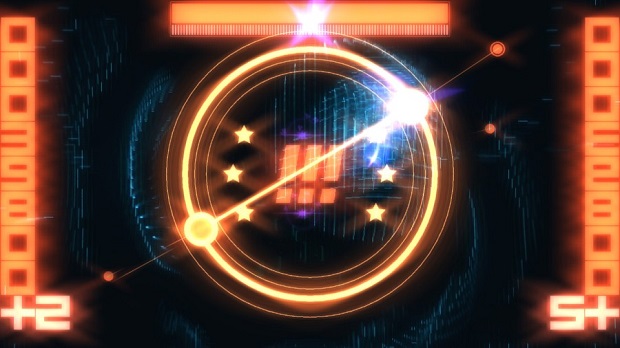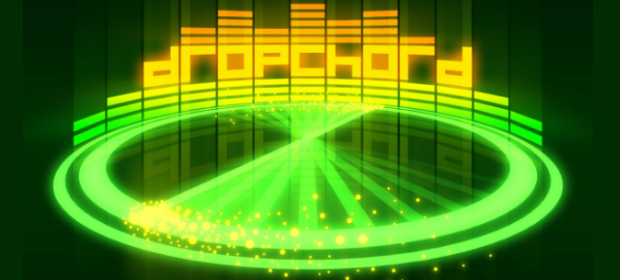When people think of Double Fine Productions, they probably think of games such as Psychonauts and Brutal Legend, games that have the unmistakable feel of Tim Schafer. What you probably wouldn’t expect to come out of the indie development house is a rhythm music game that looks like a bunch of the designers dropped acid during its development – and yet that’s exactly what we’ve got with Dropchord, a touch-based rhythm game with psychedelic colours, an interesting control scheme and some pretty interesting musical choices.
When you first start Dropchord, it’s not entirely obvious what you’re supposed to be doing, and this is before you even start the game itself, as even the menu system is different enough to cause a slight amount of confusion in even veteran mobile gamers. It won’t take long to discover that the game wants you to simply place a thumb on either side of the screen, and select the various menu items using the line that intersects the two points. This menu navigation method provides two things: firstly, it’s a new and interesting way to move through the menus, and when something is interesting it makes us want to experience more; and secondly, it gets you used to how the game must be played, so you’re not dropped into the deep end once you begin.

The main gameplay takes part inside a circle that takes up most of the space in the centre of the screen. Inside this circle will be many different elements that you’re supposed to collect using a line that’s drawn between the two points where your thumbs are touching. Moving one of your thumbs moves the line that’s drawn between them, allowing you to collect more and more of the pieces that are presented to you by just moving your thumbs up, down and around. The whole point of the title, much like an infinite runner, is to get as far into the selection of songs as you can, without losing all of your health by hitting the many objects inside the circle that you’re meant to avoid. Each time you touch something you’re not supposed to, or lose part of your multiplyer, your health goes down; get all the way to the bottom and it’s game over, with your score recorded for future posterity. In order to gain additional health you have to get to the end of each of the “Tracks” by completing Verses and Bonus levels.
It all sounds rather confusing when written down, but if you play the game for yourself, or even just watch the video we’ve provided with this review, then you’ll get the hang of it in no time at all. Basically though, when it’s all boiled down, Dropchord is a game that tasks you with collecting certain elements while avoiding others and surviving as long as you can. Simple really.
Music is one of the big factors when you’re putting out a rhythm game, and Dropchord is no exception. While the music isn’t to my personal tastes, I’m sure there are people out there that will love it and will continue to play the game for the music alone, attempting to get further in just to discover what the next track is. While the music helps bring cohesion to the game instead of making it just another also-ran on the iOS store, it’s not hugely important that you actually listen to any of it to help with the gameplay. It’s entirely possible to play the game successfully without the music at all. You won’t be getting the full experience if you do, but it’s possible nonetheless.
VERDICT: Dropchord plays much better on the smaller screens of the iPhone/iPod Touch as opposed to the iPad, due to the two thumb control method. This shouldn’t be a deal-breaker for people with only an iPad, but it is something to keep in mind before parting with your cash.
Dropchord is an interesting title, and one that people won’t be expecting from Double Fine Productions. It’s fun to play and easy to pick up (even if it is a little confusing at first), but there’s little to keep you coming back time and again unless you really enjoy the music on offer, and so at £1.99, the price tag feels a little high for a game that won’t be much more than a passing phase for many.

DECENT. A 6/10 indicates that, while this game could be much better, it still has a fair amount to offer the player. It might be an interesting title sabotaged by its own ambition, or a game denied greater praise by some questionable design choices. Don’t avoid it outright, but approach it with caution.





